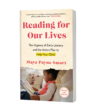This time of year, the internet abounds with reading challenges. Now, I’m all for bookish resolutions. But to be honest, I don’t want to read for a certain number of minutes per day or tackle a specified number of books in a particular genre. I’m not going to log library and bookstore visits or rate my annual reads in Excel spreadsheets, either.
An intensive reading challenge with numerous deadlines and requirements is more likely to stress me out than spark joy. I’m more of a read-what-I-feel-like-for-as-long-as-I-feel-like-it kind of person. And as the new year begins, I’m prioritizing rest and relationships over rigid goals, so any bookish resolutions have got to fit within that frame.
That said, book enthusiast that I am, I do have a few reading resolution ideas worth pondering for their ease, community spirit, and positive vibes.
Resolution #1: Read in Community. Reading is one of life’s great solitary pleasures. You can curl up in a chair alone and be transported to another world full of drama and wonder. Discussing what you’ve read with others can extend the pleasure and deepen your exploration of the world created within the book’s pages. And, frankly, in times of great social isolation and distance, it’s a great excuse to gather.
As Margaret Atwood put it, “the real, hidden subject of a book group discussion is the book group members themselves.” Sure, we may tangle over a book’s (de)merits—its plot, characters, or style—but the subtext is always our individual revelations—our biases, convictions, and doubts laid bare. What a wonderful opportunity to learn and connect.
You can find book clubs via your local library, book festival, or by asking around. Virtual options abound and socially distanced outdoor gatherings are an option even after conditions allow indoor parties to make a comeback. Or you can start one custom-suited to your interests. I recently heard of a Bad Bugs Bookclub that brings scientists and nonscientists together to read novels where infectious disease forms part of the plot. Its goal? To give epidemiology a boost in awareness and understanding. Imagine the discussion! More importantly, ponder what types of books and people you’d like to spend more time with this year and find a way to connect the dots.
Resolution #2: Go with the flow. Sometimes picking your next read is the hardest part. Take it easy by letting someone else pick every now and then. There are numerous fabulous book clubs that can help you find your next great read. A few family book subscriptions with headquarters here in Austin are Ripple Reads, Literati, and Brown Book Box.
I’m an advisor to Ripple Reads, whose family book club and workbook help families and caregivers have meaningful conversations with kids about race, justice, and empathy. Its bimonthly family discussion guides and activities are crafted in partnership with leading university professors from the University of Texas Center for Innovation in Race, Teaching, and Curriculum. What’s more, through the Ripple Reads scholarship fund, children participating in the Friends of the Children Austin mentoring program receive a free subscription. Use the code MAYAFRIEND and Ripple Reads will donate $5 of your subscription cost to the Friends of the Children Austin scholarship fund.
Resolution #3: Give books a second life. Often we let space constraints, not value judgements, guide us when it comes to which books stay in our homes. I’m a major book buyer and that’s unlikely to change (see resolutions one and two), but 2020 taught me to be more discerning about what gets a permanent place on my shelves. As I saw my shelves overflow and book piles proliferate, I had to ask myself what good the books were doing collecting dust in my house when they could actually be donated to a library to be enjoyed by other people or sold to benefit library collections or programming.
A cursory survey revealed just a few truly cherished books with powerful stories worth returning to again and again, plus a solid collection of valuable (to me) reference books. But those two categories were far outnumbered by one-read wonders and perpetual to-be-read pilers—stuff I found compelling enough to buy on impulse but not intriguing enough to actually read. It was time to let those all go.
This year, I plan to donate at least 200 books to my local library system and to community-based early literacy programs, which are always in need of gently used children’s books. A friend’s brother jots down the titles of all the books he finished to mark the experience in memory without clinging to the physical package. I like the low-tech, low-pressure approach.
Bonus Resolution: Pay It Forward
It’s been an eternity since I stood in line in a bookstore with my arms straining under the weight of a giant pile of lovingly selected books. But as soon as I can, I’ll be back in BookPeople—buying up the shelves, to be sure, but also spreading the book love to others by leaving a gift card for the shopper in line behind me. This is the perfect random act of kindness for the return to retail. Who knows? Maybe they’ll pay it forward. Hat tip to Lauren for this stellar idea!
What do you think? Will you give any of these resolutions a try? Or, do you have something else in mind? Please leave a comment to let us know.
Pin Me for Reference :



